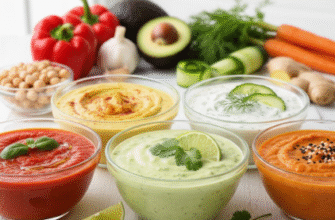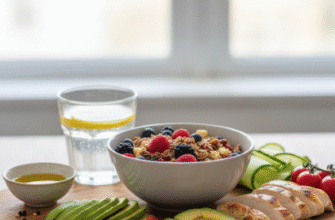The sizzle on the grill, the satisfying bite – burgers are a comfort food classic. But lately, there’s a new patty in town vying for that coveted spot between the buns: the plant-based burger. They’ve exploded in popularity, moving from niche health food stores to mainstream supermarket aisles and fast-food menus. Driven by concerns about health, the environment, and animal welfare, many people are giving these meat alternatives a try. But amidst the hype, a crucial question arises: are plant-based burgers actually a healthy choice?
The answer, perhaps unsurprisingly, isn’t a simple yes or no. It’s more nuanced, depending heavily on the specific ingredients, the level of processing, and how the burger is prepared and served. Let’s break down what goes into these patties and explore their potential health profile.
What Exactly is a Plant-Based Burger?
At its core, a plant-based burger is simply a patty made entirely from plant ingredients, designed to mimic the taste, texture, and appearance of a traditional meat burger. The ingredients used can vary wildly, leading to significant differences in nutritional content and overall healthiness. Common bases include:
- Soy Protein: Often using soy protein isolate or concentrate, these were some of the earliest veggie burgers and remain popular.
- Pea Protein: A newer key player, pea protein isolate is used in many popular brands aiming for a very ‘meaty’ texture and high protein content.
- Mushrooms: Portobello mushrooms, grilled whole, can serve as a ‘burger’, or various mushrooms are chopped and blended into patties, offering an umami flavour.
- Beans and Legumes: Black beans, lentils, chickpeas, and kidney beans are frequent stars in more traditional-style veggie burgers, often mixed with grains and vegetables.
- Grains: Quinoa, brown rice, oats, and wheat gluten (seitan) can provide structure and bulk.
- Vegetables: Beets (for colour), sweet potatoes, carrots, onions, and corn often add flavour, moisture, and nutrients.
Beyond the base, you’ll find binders (like methylcellulose or potato starch), fats (often coconut or sunflower oil), flavourings (spices, yeast extract, natural flavours), and sometimes added vitamins and minerals.
Potential Health Perks
Choosing a plant-based burger can offer some nutritional advantages over its beef counterpart, depending on the formulation.
Fiber Power
This is often a significant win for plant-based options. Beef contains virtually no dietary fiber, whereas burgers made from beans, legumes, grains, and vegetables are typically rich in it. Fiber is crucial for digestive health, helping to keep things moving smoothly and feeding beneficial gut bacteria. It also contributes to feelings of fullness, which can aid in weight management, and plays a role in regulating blood sugar levels.
Saturated Fat Situation
Generally, many plant-based burgers contain less saturated fat than a comparable beef patty, especially leaner options made from beans or vegetables. High intake of saturated fat is linked to increased levels of LDL (‘bad’) cholesterol, a risk factor for heart disease. However, be aware that some newer plant-based burgers designed to mimic fatty beef use coconut oil or palm oil, which are high in saturated fat, sometimes reaching levels similar to or even exceeding those in beef. Reading the label is key here. A definite plus is that plant-based burgers are entirely free of dietary cholesterol, as cholesterol is only found in animal products.
Nutrient Contributions
Depending on the ingredients, plant-based burgers can be a good source of various vitamins and minerals. Bean-based burgers provide folate and magnesium, while soy burgers offer iron and potassium. Many commercially produced plant-based burgers are also fortified with nutrients often found in meat, such as vitamin B12 (essential for nerve function and typically only found naturally in animal products) and zinc. Again, fortification levels vary by brand.
Navigating the Downsides: What to Watch For
Despite the potential benefits, not all plant-based burgers are health halos. Some carry nutritional drawbacks that are important to consider.
The Sodium Factor
This is perhaps the biggest health concern with many commercially prepared plant-based burgers. To mimic the savory taste of meat and enhance shelf life, manufacturers often load these patties with sodium. Some popular brands contain significantly more sodium than a plain beef patty, sometimes approaching half the recommended daily limit in a single serving! Excessive sodium intake is a major contributor to high blood pressure and increases the risk of heart disease and stroke.
Always check the nutrition label! Many processed plant-based burgers can be surprisingly high in sodium. Comparing brands is essential if you’re watching your salt intake. Also, consider the overall level of processing; patties with long ingredient lists featuring isolates and extracts are generally more processed than those made primarily from whole foods like beans and vegetables.
Ultra-Processing Concerns
While burgers made simply from mashed beans and veggies are minimally processed, many popular meat-mimicking burgers fall into the category of ultra-processed foods (UPFs). These products often involve ingredients extracted from whole foods (like protein isolates) and contain numerous additives like binders, fillers, emulsifiers, and artificial or “natural” flavours to achieve a specific taste and texture. Diets high in ultra-processed foods have been linked to various negative health outcomes, though research is ongoing to understand the exact mechanisms.
Calorie and Fat Content
Don’t assume plant-based automatically means low-calorie or low-fat. Some plant-based burgers, particularly those engineered for maximum meat-like juiciness using added oils, can have calorie and total fat counts similar to, or even higher than, traditional beef burgers. The goal for some manufacturers is replicating the indulgence of a beef burger, not necessarily creating a low-fat health food.
Making Healthier Plant-Based Burger Choices
So, how do you enjoy a plant-based burger without derailing your healthy eating goals? It comes down to smart selection and preparation.
Become a Label Detective
This is non-negotiable. Pay close attention to:
- Sodium: Compare brands and aim for lower sodium options.
- Saturated Fat: Check the source (is it high due to coconut/palm oil?) and amount.
- Fiber: Look for higher fiber content, often indicating more whole ingredients.
- Protein: Ensure it meets your needs; amounts vary significantly.
- Ingredient List: Shorter lists with recognizable whole foods (beans, lentils, mushrooms, vegetables, whole grains) are generally preferable to long lists of isolates, concentrates, and additives.
Prioritize Whole Foods
Opt for burgers where the primary ingredients are whole foods like black beans, chickpeas, lentils, mushrooms, quinoa, or brown rice. These tend to be less processed, higher in fiber, and lower in sodium than many hyper-realistic meat analogues.
Consider DIY
Making your own plant-based burgers at home gives you complete control over the ingredients. You can minimize sodium, choose healthy fats, maximize whole grains and vegetables, and customize the flavour to your liking. Numerous simple recipes are available online using beans, lentils, mushrooms, or vegetables as a base.
Mind Your Toppings and Sides
A healthy patty can quickly become an unhealthy meal depending on what accompanies it. Choose a whole-wheat bun over refined white bread. Load up on fresh vegetable toppings like lettuce, tomato, onion, and pickles instead of relying solely on cheese and creamy sauces. Opt for baked sweet potato fries, a side salad, or grilled vegetables instead of deep-fried French fries.
Cooking Method Counts
Grilling, baking, or pan-frying with minimal oil are healthier cooking methods than deep-frying. These methods add less extra fat to your meal.
The Takeaway on Plant-Based Burgers
Plant-based burgers can absolutely be part of a healthy diet. They offer potential benefits like increased fiber intake and potentially lower saturated fat compared to beef. However, they are not automatically healthy by default. Many popular options are highly processed and packed with sodium, and some can be high in calories and saturated fat.
The key is mindful consumption. By reading labels carefully, prioritizing burgers made from whole plant foods, controlling portion sizes, and pairing them with nutritious buns, toppings, and sides, you can enjoy the plant-based burger trend in a way that supports your well-being. They offer variety and can be a great way to reduce meat consumption, but like any food, conscious choices make all the difference.








